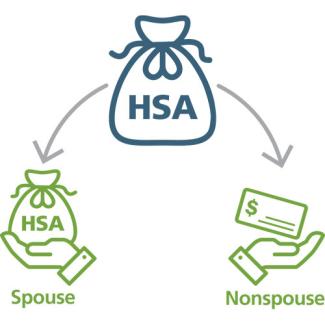
Inherited Health Savings Accounts: How Your Beneficiaries Are Affected
The triple tax savings benefits of Health Savings Accounts (HSA) make it an attractive savings option, not only for medical expenses but for potential retirement savings. (More information on the benefits of an HSA can be found in our earlier blog here.) Just like with any other retirement account, one should consider adding a beneficiary to an HSA. An account holder should consider what would happen to this account if they were to pass away with leftover funds. Here, we go over the three most common beneficiary designations and how the HSA is treated when inherited.
Spousal Beneficiary
A spouse being the beneficiary is the simplest of these three scenarios as there are no tax implications. The surviving spouse of an HSA can simply transfer or maintain the HSA as if it were their own and continue using the HSA for medical expenses or for retirement expenses after age 65 (taking non-qualified medical expenses before age 65 will result in a 20% tax penalty).
Non-Spousal Beneficiary
Unlike Inherited IRAs where non-spouse beneficiaries have a few distribution options to consider, should anyone other than a spouse be named a beneficiary under an HSA, the following events will occur:
- The HSA will lose its status as an HSA and become a taxable account
- The fair market value of the account at the deceased owner’s date of death must be distributed to the beneficiary.
- The distribution to the beneficiary will be fully taxable as income.
Non-spouse beneficiaries of large HSAs may find themselves stuck with a larger tax liability once tax season comes around. In this type of scenario, the taxable value of the HSA could potentially be reduced by paying for qualified medical expenses that deceased account owner incurred prior to their death, thus lowering how much will be taxable to the non-spouse beneficiary.
No Beneficiary (Estate as Beneficiary)
Not naming a beneficiary or naming the estate as beneficiary has similar implications as the second scenario. The HSA will cease being an HSA and the value of the account will be included in your final tax return as income.
Conclusion
Ultimately, the benefits of an HSA clearly outweigh the potential tax liability drawbacks that one may face as a beneficiary. In general, account owners over 65 should consider spending down an HSA before dipping into other retirement accounts, as it can help pay for qualified medical expenses, retirement expenses, and potentially reduce how much will be taxable to non-spouse beneficiaries.
Weingarten Associates is an independent, fee-only Registered Investment Advisor in Lawrenceville, New Jersey serving Princeton, NJ as well as the Greater Mercer County/Bucks County region. We make a difference in the lives of our clients by providing them with exceptional financial planning, investment management, and tax advice.

